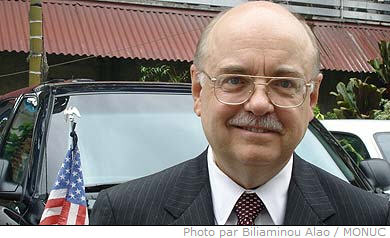The Ambassador of the United States in the DRC, Roger Meece, talks about the US sanctions against violators of the arms embargo and against those recruiting child soldiers and takes stock of the electoral process. This will is persistent as it is obvious that there are still major challenges for the Congo. Our will, our determination as well as the one of the other partners will continue. According to my information, everything’s going fine so far, in compliance with the procedures and the previsions of the IEC. I am waiting like everybody else for the results, but so far my impression is that the process is going fine. As for this aspect, the democratic exercise in every country including my own is the same. One can compare this and of course, like every country in the world including the DRC, we in the United States study systematically the procedures in order to improve the process for the next time. 
INTERVIEW
President Bush has decided to freeze the assets of persons who have contributed to the conflict in the DRC and of those who are recruiting child soldiers. Why now, in the course of this transitional period?
The executive order has indeed been signed recently. This is to show our determination to put into force these sanctions that have been already adopted by the United Nations Security Council, so it’s merely about the implementation of these sanctions.
Every member state of the United Nations has the responsibility to adopt these sanctions and we want to do this. I can even add that, with regard to the success of the transitional process, no one has the right to threaten the order, the security of civilians and the stability of the country. Therefore it’s important that all countries take the necessary steps to ensure the implementation of these sanctions as well as to support the efforts made for peace in the DRC.
What are these steps to be taken?
There are several steps: seize the assets in the United States of the persons listed, block certain accounts. We have to implement the sanctions according to the procedures and rules of the Security Council.
Do these persons really have assets in the United States?
I cannot confirm this, but we have an obligation to impose sanctions against the persons on the list, in compliance with the decision of the Security Council. This measure signed by President Bush authorizes our institutions to investigate and to take measures concerning the assets or any other necessary steps.
Some of the accused have already disclaimed their participation in the conflict in the DRC. On which criteria is this measure based?
As I said before, it’s according to the criteria and the precise list notified by the UN authorities and therefore according to the steps taken by the Security Council. We follow and respect our obligations as a member state of the system.
How does the International Community contribute with regard to this decision?
I cannot speak on behalf of the American government and I would like to show that we take the necessary action to implement these measures. I am confident that all the member states, according to their capacity, their determination, will implement the appropriate measures in compliance with the different system of each respective government.
Do you already have an idea about the role of the CIAT after the Transition?
I cannot speak on behalf of the CIAT, as you know there is no official spokesperson for the CIAT, but according to the Sun City Accord, the CIAT mandate will end after the installation of the newly elected president of the Congo.
Of course there is a will among the members of the CIAT to continue our cooperation. The International Community is involved in an unprecedented way since the beginning of the Transition in order to support the Congolese people in the successful accomplishment of the Transition.
What is your opinion about the procedure of the counting of the votes?
I have had the opportunity and the honor to accompany the American deputy under-secretary of State in charge of African affairs, Donald Yamamoto, when visiting several polling stations on Election Day. According to my personal information as well as the information received by some observers, I have been impressed by the way the elections were held and by the work and the preparations by the IEC.
Your Excellency, your country organizes today the midterm elections to designate the deputies, senators and governors. What analogies do you see with the elections in the DRC?
Elections are always a democratic exercise. We are waiting to see the turnout of voters in the United States like we did it in the DRC because, in order to know about the success of a democratic process, it’s necessary that everybody becomes involved in the process. It is important that the voter participation is as high as possible during and even after the elections.
Related articles
- • U.S. Sanctions Rwanda Over Use of Child Soldiers by M23 Rebels (October 4, 2013)
- • Presidential Election Results Delayed 48 Hours (December 6, 2011)
- • UN Security Council calls for credible and peaceful elections (October 17, 2011)
- • Case of UN Employee Caught Smuggling Minerals Not Unique (August 25, 2011)
- • Security Council extends mandate of UN mission in DR Congo (June 28, 2011)
- • UN envoy tells Security Council of improving security, remaining threats (June 9, 2011)
- • Ban Ki-moon arrives in Rwanda to discuss upcoming report on DR Congo rights violations (September 7, 2010)
- • UN mission speaks out after human rights defender is kidnapped (August 31, 2010)
- • UN Defends Inaction on Mass Rapes in Eastern Congo, Government Missing in Action (August 26, 2010)
- • Veteran United States diplomat appointed to top UN post in DR Congo (June 9, 2010)
- • US Ambassador Comments on DRC Election Process (August 10, 2006)







